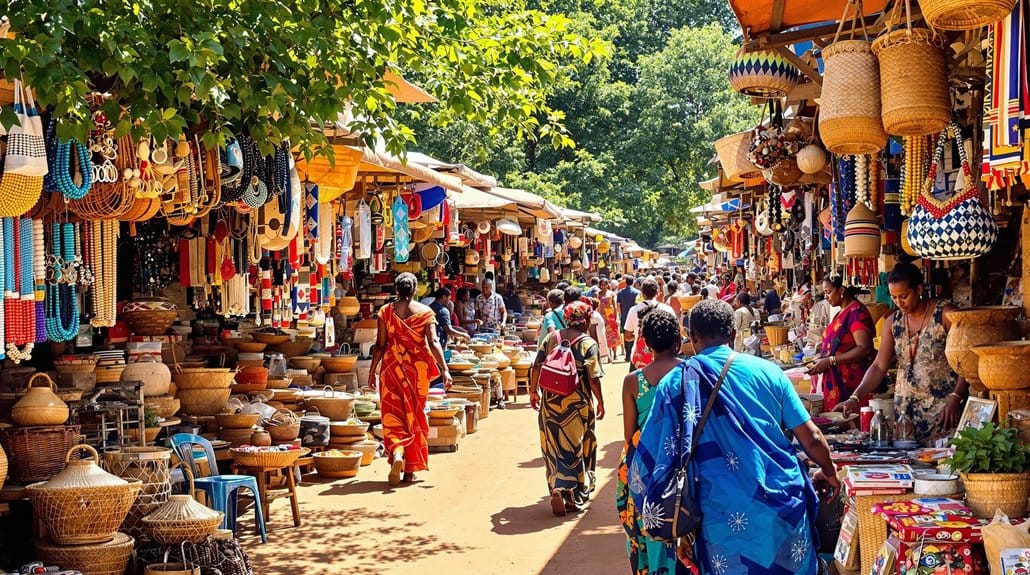You might be surprised to learn that Africa's local markets are not just places to shop; they're vibrant ecosystems of culture and community. As you navigate through the colorful stalls, you'll encounter unique artisan crafts that embody centuries of tradition and skill. Each item has a story, often tied to the artisan's heritage, offering a glimpse into the rich tapestry of local life. But what truly sets these markets apart is the profound connection between the goods and their creators, inviting you to explore the impact of your choices on these communities.
Key Takeaways
- Local markets are vibrant hubs, offering a rich array of artisan crafts that reflect Africa's diverse cultural heritage and traditions.
- Visitors can discover unique culinary ingredients, essential for traditional dishes that showcase the continent's diverse flavors and cooking techniques.
- Engaging with artisans supports fair trade practices, ensuring fair wages and economic resilience within local communities.
- Markets serve as social gathering spots, fostering connections among different ethnic groups and reinforcing cultural identity through shared meals and festivals.
- Participating in market tours and workshops provides immersive experiences, enhancing appreciation for traditional craftsmanship and promoting sustainable practices.
The Vibrant Atmosphere of Local Markets
When you step into a local market in Africa, you're immediately enveloped by a vibrant atmosphere that pulses with life. The rich tapestry of sounds—vendors calling out, laughter echoing, and traditional music playing—creates an exhilarating soundtrack that draws you in.
Brightly colored fruits and vegetables line the stalls, their aromas mingling with the scent of spices that speak volumes about the continent's diverse cultural heritage.
As you wander through, you'll notice the intricate handmade textiles and crafts, each piece telling a story of local craftsmanship and tradition. The lively environment isn't just about commerce; it's a celebration of community.
Markets serve as social hubs where people gather, fostering connections among various ethnic groups, each contributing to the rich cultural mosaic.
You might find yourself tapping your feet to the rhythm of a dance performance, feeling a sense of belonging as locals and tourists alike share in this engaging experience.
These markets are crucial not just for their economic significance, but for preserving and showcasing the vibrant cultural heritage that thrives within them.
You're not just a visitor here; you're part of something larger, a living representation of Africa's dynamic spirit.
Unique Artisan Crafts and Goods
Exploring the artisan crafts in Africa's local markets offers an immersive glimpse into the continent's rich cultural tapestry. You'll find vibrant stalls brimming with unique artisan crafts that tell the stories of diverse communities.
In Morocco, artisans skillfully create intricate leather goods and colorful rugs, each piece a reflection of traditional techniques passed down through generations. Meanwhile, in Ghanaian markets like those in Accra, Kente cloth dazzles with its vibrant patterns, symbolizing cultural identity and celebrated in ceremonies worldwide.
As you wander through Nigeria's markets, you'll marvel at the beautiful wood carvings and beadwork crafted from indigenous materials. Each design embodies the local culture and history, inviting you to appreciate the artistry behind every piece.
These unique artisan crafts aren't just beautiful; they're essential to the livelihoods of thousands of artisans across Africa, fostering community empowerment and preserving traditional skills in a rapidly changing world.
Cultural Heritage Reflected in Markets
Africa's local markets pulsate with the heartbeat of cultural heritage, where every stall and vendor reveals a story steeped in tradition. As you meander through the vibrant aisles, you encounter artisans showcasing their handmade crafts, textiles, and jewelry, each piece a representation of the unique techniques and symbolism of their communities.
These creations preserve ancestral knowledge, connecting you to the rich tapestry of over 3,000 distinct cultures spread across the continent.
Every market visit offers a sensory feast, with colors, textures, and sounds that celebrate cultural heritage. You might witness community festivals, where music and dance fill the air, fostering a strong sense of identity and belonging among the locals.
These gatherings transform markets into cultural epicenters, inviting you to partake in the stories woven through generations.
As you explore, the presence of historical artifacts and crafts reminds you of Africa's ancient civilizations, enriching your understanding of the continent's diverse cultural history.
In these local markets, you don't just shop; you immerse yourself in a living narrative, where every interaction deepens your connection to the vibrant cultural heritage that defines this beautiful land.
Culinary Delights and Traditional Flavors
When you explore local markets in Africa, you'll discover a treasure trove of unique ingredients that bring traditional dishes to life.
From the aromatic spices of Ethiopia to the hearty grains of West Africa, each region showcases its own flavorful cultural gems.
Traditional cooking techniques, like open-fire grilling and clay pot cooking, preserve these authentic flavors, making every bite a connection to the past.
Unique Local Ingredients
Culinary adventure awaits as you discover the unique local ingredients that define Africa's vibrant food culture. From the gluten-free teff grain of Ethiopia, essential for making injera, to Madagascar's exquisite vanilla, each ingredient tells a story of local communities and their rich culinary heritage.
As you wander through bustling markets, you'll encounter indigenous vegetables like African eggplants and black-eyed peas, which not only enhance flavor but also promote nutritional diversity among populations.
Spices are another treasure; take note of peri-peri sauce, crafted from fiery bird's eye chili, which adds a spicy kick to Southern African dishes. You'll find that these local spices and herbs create a tapestry of bold flavors, connecting you to the heart of the region.
Don't forget to sample unique fruits like baobab, renowned for its high vitamin C content, often found in invigorating beverages and delightful desserts. Each ingredient reflects the agricultural biodiversity of Africa and highlights the intimate relationship between local communities and their land.
Embrace these culinary delights, and you'll feel a sense of belonging to a culture that celebrates tradition and flavor.
Traditional Cooking Techniques
In the heart of many African kitchens, traditional cooking techniques come alive, transforming simple ingredients into extraordinary meals. These methods not only celebrate the rich culinary heritage but also foster a sense of community and belonging.
As you immerse yourself in these techniques, you'll discover how they enhance flavors and preserve the nutritional value of your meals.
- Slow-cooking in clay pots: This method infuses dishes with deep flavors, allowing spices and herbs to mingle beautifully.
- Steaming in banana leaves: This technique not only retains moisture but also imparts a subtle, earthy aroma to the food.
- Open-fire grilling: The smoky essence from the flames creates an irresistible char that elevates the simplest of ingredients.
Embracing these traditional cooking techniques, you'll find that fermentation plays a crucial role, particularly in dishes like injera and ogi, improving digestibility while adding unique tastes.
Flavorful Cultural Dishes
Exploring Africa's local markets reveals a treasure trove of flavorful cultural dishes that reflect the continent's rich tapestry of traditions and ingredients. With over 3,000 ethnic groups, each region boasts unique culinary gems like West Africa's jollof rice and Ethiopia's injera. You'll find that every bite tells a story shaped by years of history and cultural practices.
As you wander through bustling street food markets in Marrakech or Lagos, the vibrant array of flavors beckons you. Dishes like biltong, bunny chow, and samosas offer an authentic taste of African food culture, uniting locals and visitors alike. The use of spices like berbere from Ethiopia and peri-peri from Mozambique enhances these dishes, making each meal an adventure for your taste buds.
Communal meals, such as tagine in Morocco and pap en vleis in South Africa, serve as focal points for family gatherings, emphasizing the importance of sharing food.
Festivals like the Cape Town Food & Wine Festival celebrate these culinary traditions, reinforcing food's role in cultural identity and inviting you to embrace the flavors of Africa. Let these delectable dishes connect you to the heart of the continent.
The Role of Community in Markets
Building vibrant local markets in Africa hinges on the active participation of the community, which transforms these spaces into more than just commercial centers. When you engage with your local market, you're not just shopping; you're nurturing connections that sustain cultural heritage and economic significance.
- Imagine the buzz of laughter as neighbors share stories while browsing stalls filled with colorful textiles and handmade crafts.
- Envision lively festivals showcasing local cuisine, where aromas waft through the air, drawing you into a tapestry of traditions.
- Picture artisans enthusiastically demonstrating their skills, passing down techniques that keep age-old practices alive.
Community engagement in these markets cultivates a sense of belonging, inviting you to invest in your local economy.
It allows vendors to collaborate, pooling resources and knowledge, enhancing their bargaining power and ensuring that every purchase contributes to a greater cause.
By participating, you're not just buying goods; you're preserving legacies for future generations.
This synergy transforms local markets into essential economic hubs that foster sustainability, ensuring that the rich tapestry of African culture thrives in the heart of the community.
Sustainable Practices in Artisan Production
Artisan production in Africa thrives on a foundation of sustainable practices that not only protect the environment but also celebrate cultural heritage. By using locally sourced materials, artisans reduce their environmental impact while supporting local economies. This connection to the land fosters a sense of belonging, as you witness the vibrant colors and textures of handcrafted goods that tell a story.
Many artisans incorporate traditional techniques passed down through generations, ensuring that their craft remains authentic and rooted in culture. This method minimizes reliance on industrial processes, allowing for a more harmonious relationship with nature.
The rise of fair trade initiatives plays a crucial role here, encouraging ethical production practices, fair wages, and safe working conditions for craftspeople.
You'll find that eco-friendly methods, like natural dyeing and upcycling waste materials, are increasingly embraced by artisans, creating unique products that reflect their commitment to sustainability.
Community-based cooperatives further strengthen this movement, fostering collaboration and resource sharing among local craftspeople. By supporting these sustainable practices, you're not just purchasing a product; you're becoming part of a larger community dedicated to preserving both heritage and the environment.
Connecting With Local Artisans
When you connect with local artisans in Africa, you're not just buying a unique piece of craftsmanship; you're supporting traditions that have thrived for generations.
Each handcrafted item tells a story, offering a glimpse into the rich cultural heritage of the region and fostering meaningful exchanges between you and the creators.
Plus, your support helps sustain local economies, promoting sustainable growth and empowering communities.
Supporting Traditional Craftsmanship
Supporting traditional craftsmanship in Africa means embracing the rich cultural heritage that local artisans bring to life through their unique creations. By connecting with these talented individuals, you're not just purchasing a product; you're participating in a story that spans generations.
When you explore local markets, you'll find:
- Handwoven baskets, intricately designed to reflect the weaver's community and history, each telling its own tale.
- Carved wooden figurines, showcasing the skill of artisans who use techniques passed down through families, capturing the spirit of their culture.
- Vibrant textiles, dyed with natural materials, representing local traditions that celebrate color and craftsmanship.
These traditional crafts not only enrich your experience but also support local economies. By choosing to buy directly from artisans, you empower them, ensuring fair compensation for their labor.
Additionally, many artisans practice sustainable methods, using locally sourced materials that honor both their craft and the environment. Engaging with traditional craftsmanship fosters a sense of belonging, as you connect with stories and cultures that define Africa's vibrant identity.
Your support helps keep these invaluable traditions alive, preserving the cultural tapestry of the continent for future generations.
Cultural Exchange Opportunities
Local markets across Africa burst with opportunities for cultural exchange, inviting you to immerse yourself in the continent's rich artistic traditions. Here, you can connect with local artisans who proudly showcase their handmade crafts, from intricate wood carvings to vibrant textiles. Each piece tells a story, reflecting the heritage and history of its creator.
You'll find workshops and demonstrations that allow you to learn traditional techniques, fostering a deeper appreciation for the craftsmanship. This direct interaction not only enriches your experience but also supports fair trade initiatives that empower local communities economically.
| Artisan Craft | Cultural Significance |
|---|---|
| Wood Carving | Reflects ancestral storytelling |
| Textile Weaving | Symbolizes tribal identity |
| Pottery Making | Connects to daily life rituals |
| Jewelry Design | Represents cultural beliefs |
Engaging in these cultural exchanges provides a sense of belonging, as you share laughter, stories, and skills with artisans. You're not just a visitor; you're a participant in a vibrant tapestry of traditions that span generations. Embrace these moments, and let them enrich your journey through Africa's local markets.
Sustainable Economic Growth
How can connecting with local artisans lead to sustainable economic growth in African communities? By supporting these dedicated creators, you're not just buying a product; you're investing in a future filled with hidden treasures.
Local artisans are the heartbeat of their communities, preserving cultural heritage while providing essential job opportunities. Here are three significant ways this connection fosters sustainable growth:
- Job Creation: Engaging with artisans opens up new employment opportunities, helping to alleviate poverty and uplift entire families.
- Cultural Preservation: By purchasing handmade crafts, you encourage the passing down of traditional skills, enriching the community's identity and sense of belonging.
- Sustainable Practices: Many artisans use locally sourced materials and eco-friendly methods, making their products not only unique but also environmentally responsible.
When you connect with local artisans, you're not just supporting their craft; you're participating in a movement that strengthens local economies and nurtures the cultural fabric of Africa.
This symbiotic relationship guarantees that the wealth generated stays within these communities, empowering them to thrive for generations to come.
Stories Behind Handcrafted Treasures
Wandering through the vibrant stalls of African markets, you'll discover an array of handcrafted treasures, each with its own enchanting story. These unique items, crafted by skilled artisans, often reflect the rich cultural heritage of their communities.
As you explore, you'll notice that many pieces are made from locally sourced natural resources—beads, wood, and textiles—all showcasing the continent's diverse offerings.
The stories behind these treasures are deeply rooted in ancestral techniques, passed down through generations. Each item carries significant cultural symbolism, connecting you to the history and traditions of the artisans.
While browsing, you may hear tales of how these crafts aren't just products, but expressions of identity and belonging.
Artisans actively participate in workshops and community initiatives, promoting their crafts and fostering economic empowerment. This shared passion for preserving traditional art forms creates a sense of unity amidst the challenges of globalization.
Local markets become vibrant platforms for cultural exchange, inviting you to engage with the history and significance of each handcrafted piece. As you connect with these stories, you'll deepen your appreciation for Africa's artistic expression and the communities behind them.
Market Tours: A Cultural Experience
Often bustling with energy and vibrant colors, market tours in Africa offer you a unique glimpse into the continent's rich cultural tapestry. You'll find yourself immersed in the lively atmosphere, engaging directly with the local community and experiencing their heritage sites.
Here are three highlights you won't want to miss:
- Traditional Barter Systems: Witness how locals exchange goods rather than using money, emphasizing the spirit of community.
- Artisans at Work: Observe skilled craftspeople creating intricate woven baskets and beautifully carved sculptures, showcasing the deep-rooted artistry of various ethnic groups.
- Cultural Celebrations: Experience local festivals filled with music and dance, allowing you to connect with the region's traditions and history.
These market tours not only support local artisans and small businesses but also cultivate a sense of belonging.
As you explore vibrant souks in Morocco or craft markets in Ghana, you'll discover that each item has a story, enhancing your appreciation for African culture.
Preserving African Heritage Through Commerce
When you visit local markets in Africa, you're not just shopping; you're stepping into a vibrant world where cultural artifacts and crafts come alive.
Each handcrafted item tells a story, reflecting the skills and traditions of local artisans who pour their heritage into every piece.
Cultural Artifacts and Crafts
Local markets in Africa burst with life and color, serving as essential spaces where cultural artifacts and crafts thrive. Here, you'll find treasures that tell stories and capture the essence of diverse traditions.
These vibrant hubs not only support artisans but also foster a sense of community and belonging.
As you stroll through the market, imagine discovering:
- Handwoven textiles that showcase intricate patterns, each telling tales of the weaver's heritage.
- Intricately carved wooden sculptures representing local myths and legends, crafted with techniques passed down through generations.
- Unique pottery reflecting regional identities, beautifully painted with designs that speak of the earth and its culture.
These cultural artifacts play a crucial role in preserving African heritage. By purchasing these handmade goods, you contribute to a sustainable economic model that empowers local artisans.
Markets become not just shopping destinations but also platforms for cultural exchange, where the rich narratives of Africa are shared with the world. Engaging with these crafts allows you to connect with the heart of the community and appreciate the traditions that shape their identities, ensuring that these invaluable skills endure for generations to come.
Supporting Local Artisans
Supporting local artisans is more than just a transaction; it's a celebration of cultural heritage and community resilience. When you support these talented individuals, you're not only investing in unique, handcrafted goods but also preserving Africa's rich traditions and stories. Local markets are vibrant hubs where artisans showcase their craftsmanship, from intricate textiles to stunning artwork.
By embracing fair trade practices, you're empowering these artisans, ensuring they receive fair compensation for their skills. This fosters economic resilience and strengthens the fabric of local communities.
Here's a glimpse into the impact of supporting local artisans:
| Benefit | Description | Example |
|---|---|---|
| Sustainable Livelihoods | Provides artisans with consistent income | Craft fairs and local shops |
| Preservation of Skills | Maintains traditional techniques and crafts | Generational knowledge |
| Cultural Exchange | Fosters appreciation for diverse cultures | Storytelling through art |
When you buy local, you're part of a movement that values heritage and nurtures community growth. So next time you visit an African market, remember you're not just shopping; you're weaving a rich tapestry of culture and connection.
Frequently Asked Questions
What Are the Treasures Found in Africa?
When you explore Africa, you'll discover incredible treasures—cultural artifacts like vibrant textiles, intricate pottery, unique wooden masks, and aromatic spices. Each piece tells a story, inviting you to connect with the continent's rich heritage.
What Is the Unfound Treasure in South Africa?
You might stumble upon unfound treasures in South Africa's vibrant local markets, where cultural heritage breathes life into handcrafted goods, telling stories of tradition, resilience, and community, waiting for you to discover their hidden beauty.
What Does Africa Need the Most?
Africa needs economic empowerment the most. When you invest in local businesses, support fair trade, and promote sustainable practices, you'll help communities thrive, fostering a sense of belonging and pride in their rich cultural heritage.
What Resources Were Stolen From Africa?
During colonial exploitation, Africa lost invaluable resources like gold, diamonds, and precious metals. Illicit financial flows drained wealth, while agricultural products were exported unfairly, leaving communities struggling and rich cultures looted, stifling their heritage and growth.
Conclusion
As you explore Africa's local markets, remember that these vibrant spaces do more than sell goods—they breathe life into communities. Did you know that over 60% of Africa's workforce is employed in the informal sector, often found in these bustling markets? This statistic highlights the profound economic impact of your purchases. By supporting local artisans, you're not just taking home a unique treasure; you're empowering communities and preserving their rich cultural heritage for generations to come.








